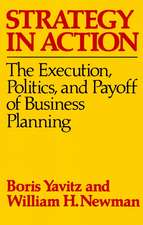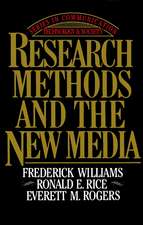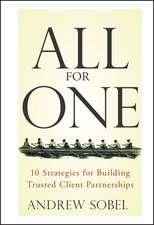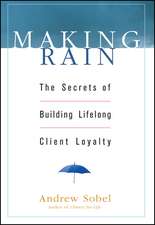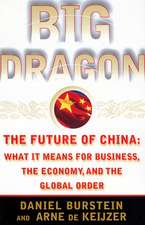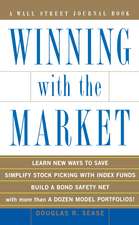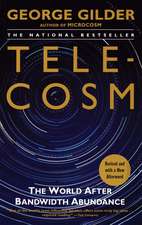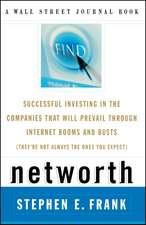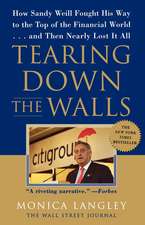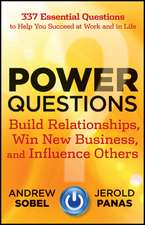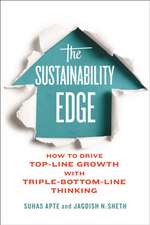Clients for Life: Evolving from an Expert-for-Hire to an Extraordinary Adviser
Autor Andrew Sobel, Jagdish Shethen Limba Engleză Paperback – 15 iul 2002
Preț: 106.37 lei
Nou
Puncte Express: 160
Preț estimativ în valută:
20.36€ • 21.28$ • 17.20£
20.36€ • 21.28$ • 17.20£
Carte disponibilă
Livrare economică 14-28 februarie
Preluare comenzi: 021 569.72.76
Specificații
ISBN-13: 9780684870304
ISBN-10: 0684870304
Pagini: 272
Dimensiuni: 140 x 214 x 25 mm
Greutate: 0.25 kg
Ediția:Reprint
Editura: Free Press
Colecția Free Press
ISBN-10: 0684870304
Pagini: 272
Dimensiuni: 140 x 214 x 25 mm
Greutate: 0.25 kg
Ediția:Reprint
Editura: Free Press
Colecția Free Press
Notă biografică
Jagdish Sheth is the Charles H. Kellstadt Professor of Marketing at the Goizueta Business School, Emory University, and the founder of the Center of Relationship Marketing. He has served as an advisor and consultant to AT&T, Lucent, Motorola, and Young and Rubicam, and contributes regularly to The Wall Street Journal and other publications. He lives in Atlanta, Georgia.
Extras
Chapter 1
What Clients Want
From Knowledge Worker to Wisdom Worker
The great professional helps you eliminate issues that are not a problem, and then he focuses you in on the really critical dimensions of the situation. You are permitted to be a bit confused and general. And at the right moment, the good ones ask the right questions. It's an iterative process; you don't want someone peddling a solution, who comes with an agenda -- which many do. The good adviser excels at the integration process, but he doesn't necessarily arrive at the solution for you. He knows my industry, but is broader than that. Finally, he can bring you comfort as well. Empathy, not sympathy.
Ray Smith, former chairman and CEO, Bell Atlantic
In January of 1941, President Franklin D. Roosevelt invited Wendell Willkie, who had lost his own bid for the presidency the year before, to visit him at the White House. Sitting in front of the fireplace in the Oval Office, Willkie steered the topic of conversation to Harry Hopkins, who was Roosevelt's most trusted adviser. Hopkins had been instrumental in helping Roosevelt clarify and achieve his objectives as president, undertaking sensitive diplomatic missions to meet Churchill and Stalin and providing sage counsel during times of crisis. Self-effacing, incorruptible, and enormously capable, Hopkins nonetheless drew fierce criticism because of his intimate relationship with Roosevelt. "Why," asked Willkie, "do you keep Hopkins so close to you? You surely must realize that people distrust him and resent his influence."
Roosevelt stared directly at Willkie and replied, "Someday you may well be sitting here where I am now as president of the United States. And when you are, you'll be looking at that door over there and knowing that practically everybody who walks through it wants something out of you. You'll learn what a lonely job this is and discover the need for somebody like Harry Hopkins who asks for nothing except to serve you."
The extraordinary advisers among today's professionals -- those individuals who develop breakthrough client relationships -- share many characteristics with Harry Hopkins, and they are as valued by their clients as Hopkins was by Roosevelt. Let's begin by looking at two in particular, James Kelly and Nancy Peretsman.
James Kelly: The Ultimate Corporate Troubleshooter
Management consultant James Kelly always seems to work a bit of magic with his top management clients. Having founded and led a major international consulting firm, Kelly now advises a small group of senior executives on issues ranging from corporate strategy to leadership and organization design, frequently shuttling between Europe and the United States. He combines deep expertise about corporate strategy development with a remarkable breadth of knowledge of other functional areas, such as finance, marketing, and operations, and then layers in empathetic listening, well-developed powers of intellectual synthesis, and keen judgment.
Win Bischoff, chief executive of the leading British merchant bank Schroders, has used Kelly as his adviser for eighteen years. As an investment banker and a company CEO, Bischoff is himself a master of the advice business, and a very discerning client. Talking about Kelly, he says, "What sets him apart is his genuine, deeply felt conviction; his bedside manner -- important here in Europe -- which is relaxed and nonthreatening; his empathy and listening skills; and the fact that he's able to see the big picture very clearly. Sometimes he offers specific ideas or solutions, but on other occasions he helps us arrive at them ourselves." Bischoff's praise is not surprising: over the years Kelly has pushed Schroders in some controversial directions -- encouraging it to stay out of the equity brokerage business in the United Kingdom, for example -- that turned out to be dead right for this highly successful merchant bank.
Sir Brian Pitman, chairman of Lloyds TSB Group and another client of Kelly's, echoes Bischoff's praise: "Back in the mid-1980s, Kelly and his team confronted us with an insight that proved catalytic -- that our cost of equity was higher than we thought, and we weren't earning it. This was well before 'shareholder value' became a buzzword or 'economic value added' was in vogue. He helped set us on a path to maximize shareholder value, and our market capitalization today places Lloyds TSB among the top five banks in the world."
Kelly hasn't always inhabited the heights of the boardroom, however. He vividly recalls selling accounting systems door-to-door in Harvard Square in the early 1960s, during his first few years working as a consultant for Dick Vancil, the head of Harvard Business School's accounting department. Some formative and humbling experiences -- for example, starting a European business from scratch -- helped him to evolve from a business expert to a business adviser by developing his empathy, knowledge breadth, and judgment skills.
Nancy Peretsman: A Relationship Banker Conquers the Internet
It's no accident that Nancy Peretsman, an investment banker who heads the media group for Allen & Company, was the financial adviser on $77 billion in mostly Internet-related deals during the first half of 1999 alone. In an industry where client loyalties can shift frequently and unpredictably, Peretsman commands an exceptionally loyal client base that she has developed during her twenty-year career.
A large part of her success is her ability to see the big picture. While other bankers are driving headlong into the next deal without pause, she takes time to reflect on the long-term direction of the media industry and the opportunities that may present themselves. "I operate in a somewhat old-fashioned way with my clients," Peretsman tells us. "I try to give them a world view about what's happening in and around their industries, and of the role that they might play."
Despite being a star in a galaxy known for big egos, and having been recently named one of the ten most powerful women in American business, Peretsman is remarkably down-to-earth. Instead of exercising her hard-earned right to lord over teams of associates working twenty-hour days, she still routinely rolls up her sleeves and dives into the day-to-day work of merger transactions. As we'll see later on, this has some unusual benefits for her clients.
While working in the United Kingdom on the financing of new cable companies in the late 1980s, Peretsman saw how they were planning to combine video and telephone services and thought this idea would make sense in the United States. Most of the early deals involving cable and telephone companies that she tried to market in this country failed, however, because the idea was just a bit ahead of its time (not anymore -- AT&T spent over $100 billion in 1999 to buy cable companies); but her clients have remembered her prescience at this and other moments, such as when she put her own money on the line to help finance Priceline.com, the now highly valued Internet company that lets you name your own price for airline tickets and hotels. Priceline's founder and chairman Jay Walker has said that "Nancy is the confidante of about twenty moguls...she is the last generation of investment bankers whose power is their long-term relationships."
James Kelly and Nancy Peretsman work in different fields, but each of them is an extraordinary adviser to clients, and each commands enormous client loyalty. They didn't start out their careers as great advisers; in fact, both of them can cite early difficulties in learning how to develop the long-term, broad-based relationships that they both now enjoy. But they learned from their experiences, and they developed and grew. In addition to their special areas of expertise, they've developed strong powers of synthesis and keen judgment. Like the other great client advisers we'll meet in this book, they are insatiable learners. They know how to listen. They balance selflessness with objectivity and independence. They have deeply felt convictions born of a well-developed value system. And they are able to build trust through their impeccable integrity and discretion. The result? Clients come back to them again and again.
Professional Services and Advice:
A $500 Billion Industry
Behind every great leader -- in fact, behind most successful individuals -- you'll probably find at least one great adviser. Alexander the Great's tutor and counselor was Aristotle, ancient Greece's famed philosopher and scientist. France's King Louis XIII chose as his chief adviser Cardinal Richelieu, who became the architect of modern state government; and President Franklin D. Roosevelt had the services of the trustworthy Harry Hopkins as well as the great General George Marshall. References to famous advisers in history and literature are contained in words like "éminence grise," "mentor," and "Machiavellian" which are now fixtures in our modern vocabulary.
Today, a group of over five million service professionals in a variety of fields, such as management consulting, law, banking, advertising, finance, and accounting, have largely replaced the clergymen and philosophers who once advised society's leaders. Collectively, these professionals comprise what is in fact one of the largest industries in the world with over $500 billion in annual revenue. If we include all professionals who develop client relationships, such as salespeople, the total number of individuals who manage and advise clients in the United States is close to 15 million.
Virtually all of the large service firms endeavor to develop advisory or consultative relationships with their clients, emulating those very few -- McKinsey in consulting, for example, or Goldman Sachs in investment banking -- that have a history and culture of building deep relationships. Stockbrokers are now "financial advisers"; accounting and consulting firms aspire to advise senior management, not just undertake reengineering projects; software programmers are referred to as "consultants"; and companies like Reuters don't just sell databases but want to be your "information adviser." Often, however, the words "adviser" and "consultant" lack substance and have a hollow ring to them.
Ironically, just at a time when the professions are experiencing their greatest growth in history, just as so many are striving to become trusted advisers, many clients are in fact dissatisfied with the quality of the advice they receive and the attitude of those who give it. It's getting harder and harder for them to find professionals like James Kelly and Nancy Peretsman.
But why? What holds professionals back from an undeniably attractive role that is highly valued by clients?
Barriers to Developing Breakthrough Relationships
Three barriers stand in the way of becoming a business adviser to your clients, and of experiencing the client loyalty and professional fulfillment that accompany this role:
1. Most professional service firms demand specialization. If you work for a large consulting or accounting firm, you might become a reengineering expert for the chemical industry or an auditor for automotive companies. This is fine for starters, but the problem is that the more expert you become in the niche where your company has placed you, the more "valuable" -- at least in the short term -- your firm thinks you are. This becomes a disincentive to providing you with other experiences.
While there is great benefit in developing a deep expertise, this specialization will eventually become a liability if you want to play a broader-gauge role with clients. Some firms recognize this issue and try to address it by systematically diversifying the experience of their junior staff, but many do not. (This push for specialization, by the way, is pervasive not just in the business world but in medicine, academia, science, and other fields.) In addition, while large firms provide tremendous opportunities and training for young professionals, they also have financial and growth goals that must be met (many are now publicly held companies). Sometimes, these short-term pressures override the long-term process necessary to build deep, trusted client relationships.
2. Expertise is becoming automated and reduced to a commodity. Ironically, while service professionals have been major beneficiaries of the late twentieth-century information economy, there are now signs that many types of expertise are losing value. Just as the industrial revolution replaced skilled craftsmen with low-wage factory workers during the early nineteenth century, the "expertise" sold by professionals is becoming easily replicable, more widely available, and increasingly cheaper in our Internet-speed, technology-driven economy. Already, the average incomes of some classes of professionals -- doctors, for example -- are starting to decline.
Several forces combine to diminish the value of expertise:
The effects of these trends are readily apparent. In fields as diverse as law, accounting, consulting, and technology services there is significant consolidation occurring, with new mergers being announced almost monthly. What used to be the "Big 8" accounting firms are now the "Big 5." Law firms, which historically enjoyed long-term retainer relationships with their clients, are being asked to bid competitively for work; some even went out of business altogether in the 1990s, and we are now beginning to see a growth in mergers as law firms consolidate. Consulting firms are being asked by major corporations to submit breakdowns of their cost structure, their partner-to-associate ratios, and their billing schedules so that the profitability of their projects can be managed and reduced. Many companies are now conducting frequent, tough reviews of their advertising agencies, forcing incumbents to continually justify their relationship.
These and other signs of intense competition and industry maturation are now widespread. High-end services, such as merger and acquisition advisory work, may never become commodities. But just as we can now put a vacation out to bid on the Internet to see which airline wants to sell us a ticket at the best price, we believe the day is not far away when this will be done for services as well. Imagine asking doctors to "bid" to conduct a routine surgical procedure or inviting lawyers to compete for your estate planning business.
3. Many professionals are held back by stereotypes about what clients want them to be and how they should behave. Here are typical statements we have heard from these professionals:
There is some validity to all these statements. They are incomplete, however. In contrast, consider these comments from clients who have spent a lifetime using professionals:
Many professionals, in short, focus on providing answers, being perceived as "experts," doing great analysis, and specializing more and more during their careers. Clients, in contrast, seek professionals who can ask the right questions, provide knowledge breadth as well as depth, demonstrate big-picture thinking as well as analysis, and listen rather than just tell.
Professor J. Brian Quinn of Dartmouth's Amos Tuck School of Business, who has spent nearly forty years advising business and political leaders, including several U.S. presidents, puts his own slant on the issue of stereotypes: "I used to believe that solving the problem was paramount. In reality, when the good advisers deliver their recommendations, most of them have already been implemented. I realize now that the process of problem solving is more important than the solution."
Clients do value professionals who can play a broad advisory role. Theodore Sorensen, in his book The Kennedy Legacy, reports that just a few days before his inauguration, John F. Kennedy was presented with a list of 250 items requiring a decision from him. He apparently blurted out, "Now I know why Ike had Sherman Adams!" (Adams was President Eisenhower's trusted adviser). The fact is, clients at any level, whether they are presidents of nations or corporate managers, appreciate someone who can help them put their issues in perspective, solve problems, and make better, faster decisions.
Experts versus Advisers
Many of the clients we interviewed for this book made pointed references to the distinctions they saw between experts and advisers: "With an adviser, trust is critical. Of course, if you just need an expert, you don't have to trust him" was a typical comment. Our research, in fact, has suggested that experts and advisers are different in many important ways as outlined in the following table.
Professionals who are client advisers, in short, behave very differently than experts, and consequently they develop client relationships that are broader, deeper, and richer. Part of the difference lies in their skill and knowledge base: they are wide-ranging exploratory learners and big-picture thinkers. Part is due to attitude: they collaborate rather than control.
Let's be clear that there is an important distinction between expert and expertise. Both experts and great advisers have deep expertise, which they continually develop throughout their careers. But business advisers build an additional set of skills that leverage their specialized knowledge and enable them to be highly effective with clients.
Eric Silverman, for example, counsels business leaders on legal issues but does it in the context of their total business; he's an expert who has developed into a trusted adviser. With a law degree from Georgetown University, Silverman joined Milbank, Tweed, a large New York law firm, in 1981, taking an interest in a new area for the firm: financing energy projects. He sought out the only partner -- indeed the only other lawyer at Milbank -- who was doing work in this area. The two of them slowly began building up a business.
At first, he spent several years grinding out the contractual documents necessary to execute these large project financings. But because there were only two of them in the practice, Silverman quickly began to take on client management responsibilities. He actively studied the business issues inherent in these multibillion-dollar, global energy projects. His knowledge base grew well beyond the contractual issues, which is what he and his firm were ostensibly hired for. He became an expert in the companies themselves, in their strategies and their organizational structures, and in the energy markets where they conducted their operations.
Silverman's clients, typically treasurers, chief counsels, or chief financial officers, began to seek him out as a source of broad-based business advice. The other lawyers they dealt with wanted to talk about the barriers, the 200 legal points that had to be reviewed before anything could proceed. Silverman talked about the possibilities and alternatives, not the limitations. "I'm more of a constructive facilitator for these huge projects," he says modestly. "I try to get the parties to work together, to keep the big picture in front of us...some of the other attorneys who are involved get very focused on the minutiae." Today, Silverman heads Milbank's Global Project Finance group. With fifteen partners and eighty associates, it contributes one quarter of the firm's total revenues!
Compare Eric Silverman's story with the following statement we heard from a consultant at a leading management consulting firm. Keep in mind that this is a smart, engaging individual who is some eight years into his consulting career:
I specialize in the pharmaceutical industry. I know exactly how product management should be organized in a drug company. I can go into any drug company, anywhere in the world, and immediately tell them how they should organize product management. It's basically the same everywhere.
This person has in-depth expertise that is invaluable to his firm. He is highly paid. But his career, and his professional and personal satisfaction, will run dry if he continues to dip ever deeper into his current well -- product management practices in drug companies -- and fails to add breadth to his depth.
Adversity Is Part of the Plan
Although we often feel our careers should proceed from one success to the next, the development of these qualities is actually facilitated by struggles and setbacks. James Kelly survived several devastating experiences that nearly bankrupted his firm, the MAC Group; both Nancy Peretsman and Eric Silverman went through painful, dry patches where they couldn't interest their clients in any of their ideas.
Many of the famous historical advisers we'll examine also struggled. George Marshall, who became one of the towering figures of the twentieth century with the Marshall Plan after World War II, almost had to beg his way into officer training school. During the 1920s he spent many discouraging years in dead-end positions in an underfunded, ignored U.S. Army. Harry Hopkins suffered from a debilitating and ultimately fatal illness, yet as we'll see in chapter 8, he actually drew strength from his misfortune.
Learning from your struggles and taking active control of your own development will put you on the path to becoming an integrated, fulfilled professional who offers far more than just expertise to clients. You can evolve from a knowledge worker, an expert for hire, to a wisdom worker, a trusted adviser.
Think back for a moment to the analogy of the craftsman and the factory worker. When craftsmen were reduced to commodities and their work automated during the industrial revolution, it was the artists among them -- those individuals whose work transcended mere skill at working iron or wood -- who continued to thrive. Similarly, in the twenty-first century the knowledge workers who excel will be those who transcend simple expertise and are able to provide insights to their clients in the context of a collaborative, learning relationship.
Insight X Collaborative Relationship = Client Value
How do trusted advisers create value? Value is a complex concept that can mean different things to different clients, depending on their needs at a given point in time. Generally, however, value is created by solving problems, helping your clients achieve business and personal objectives, getting critical work done, and enabling your clients to feel good about themselves as people and professionals as you complete your assignment.
We have found that when leaders talk about great professionals who actually achieve these goals, they emphasize in particular the nature of the insight those professionals can offer and the quality of the relationship they share with them. The journey to becoming a great adviser, in fact, can be tracked and measured along these dimensions. Do you offer expertise and information, or can you deliver real insight? Do you work on the basis of performing tasks or transactions, or are you capable of developing deep, long-lasting, and collaborative relationships? The accompanying illustration sets out these key dimensions and depicts the three stages of client relationships that we described in the Introduction.
Everyone begins his or her career in the lower-left box -- as an expert for hire who works on transactions (at the very start, you are not even an expert yet, you offer expertise for hire). Becoming a steady supplier usually happens naturally over time as you develop your client base. The real breakthrough occurs when you move beyond the steady supplier role -- many people never do -- and become a trusted adviser. At this stage you've put yourself in what we call the "client value zone." The closer you can get to this position, the more personally and professionally rewarding your work will be and the more effective you will become with your clients.
Clients define insight broadly; it doesn't have to be a radical new idea or inspiration. Professionals who are insightful, clients tell us, do some or all of the following things:
Remember that advisers who provide insight also bring to bear some kind of deep expertise, which is still very important in this game. Strong, consistently demonstrated professional competence in your specialty is both the ticket for admission and an ongoing requirement; we don't want to downplay it.
Clients define their relationship with trusted advisers using words like "trust," "shared values," "integrity," "chemistry," and so forth; it's far more than golf and lunch. Fundamentally, a relationship enables you to learn about your client. Through the relationship, you end up knowing more about your client -- about his needs, preferences, and habits -- than anyone else, and your ability to provide insights rather than just information or generic recommendations increases significantly. This creates a powerful entry barrier for competing professionals who may want your client's business.
Building a relationship takes time. In the words of Jim Robbins, CEO of Cox Communications, "Nobody calls you up on the telephone and says, 'Hey, I'm your adviser.' No way! You have to build trust and establish that there are shared values." Echoing this from the adviser's perspective, the former chairman of an old-line U.K. merchant bank once said, "One of the facets of the art is that if you do not get on with the people you are trying to advise, then you find yourselves out the door."
The collaboration that develops between you and your client also amplifies your own expertise. Rather than just imparting information or knowledge -- a one-way street -- you collaboratively develop solutions. Your knowledge and experience play off against your client's knowledge and experience in a constructive, creative fashion. Ultimately, the deeper the relationship, the more insight you're able to bring to the table, and this in turn reinforces your value.
The Ingredients for Breakthrough Relationships
There are seven key attributes that, when blended together in the right quantities and in the right manner, facilitate the development of insight and the formation of deep, trusting relationships. These characteristics are a blend of innate talent, acquired skill, and attitude, and it's pointless to try to determine exactly which is which. That's why we use the more general term "attribute" to describe them. Empathy, for example, is definitely something you develop at a young age (a "talent"), yet we know that people can improve their empathetic ability late in life. Native ability certainly counts, but hard work and openness to change can improve any of these qualities, an assertion borne out by the experiences of the many great professionals we've studied.
There is a natural, logical progression to the development of these attributes and to the order in which they usually come into play in building an advisory relationship. The two foundational attributes for any professional who aspires to serve clients are selfless independence and empathy. Great advisers have an attitude of complete financial, intellectual, and emotional independence. They balance this independence, however, with selflessness -- they are dedicated, loyal, and focus on their client's agenda, not their own. It is a fine line to draw: on the one hand, being responsive to a client's needs and problems and, on the other, maintaining objectivity and honesty at all times. This selfless independence illustrates why clients are different from customers.
The second attribute, empathy, is what opens the door to learning. Empathy fuels your ability to discern a client's emotions and thoughts, and to appreciate the context within which that client operates. It enables you to diagnose what the problem really is and later underpins a learning relationship with your client. Dr. Michael Gormley, a London-based physician and renowned diagnostician who treats several members of the British royal family, provides an apt medical metaphor when he tells us, "You can't just chop the patient up into little pieces and then examine each one of them under the microscope. You have to understand the whole context of his daily life."
The next three attributes concern your ability to think and reason. You simply have to have something valuable to say before you can develop the long-term professional relationship. A passion for learning drives the professional to develop a core expertise and then to become a deep generalist by continually broadening her knowledge. Synthesis is the ability to see the big picture, to draw out the themes and patterns inherent in masses of data and information. It includes related skills, such as critical thinking and problem solving. The ability to synthesize sets the business adviser apart from the subject matter expert who relies mainly on analysis. Judgment is often -- but not always -- the culmination of a particular engagement or advice session, drawing on all the learning and synthesis you have undertaken.
Conviction and integrity constitute two important character attributes that are common to all of the extraordinary professionals we have studied. When credibility of content has been established, trust can follow, and the depth of a client's trust in you will be very much governed by his assessment of your character.
Conviction comes into play as the adviser begins to offer opinions, recommendations, and judgments in earnest. Conviction, however, does not exist in a vacuum; it is based on a set of compelling, explicit personal beliefs and values. Properly harnessed, it is a powerful force that can motivate and energize both professional and client.
The attribute of integrity comprises a constellation of skills and behaviors that build trust, including discretion, consistency, reliability, and the ability to discern right from wrong. Without this trust, it is unlikely you will develop a collaborative relationship. Your client will always keep you at arm's length and treat you like a supplier.
There are other qualities, of course -- motivation, optimism, tenacity, determination, analytical skills, and so on -- that are valuable for professionals and indeed necessary to be a successful expert. The seven we have identified, however, are the ones that truly stand out and make a difference in a professional's effectiveness. They enable you to go beyond expertise and become a broad-based adviser. These are the qualities that foster the development of the insights and relationships that lead to consistent value creation for clients, and they are the characteristics that great advisers themselves have intuitively developed. If you want, in short, to become an extraordinary professional who commands unwavering client loyalty, you need especially to develop and strengthen these attributes.
Becoming an Integrated Professional
These attributes build on and interact with each other to create a whole that is greater than the sum of the parts. Casual observers might call an individual who has successfully integrated them a "seasoned professional" or someone who really "has a head on her shoulders." Drawing on his thirty-eight years as a successful client adviser, James Kelly articulates this state of integration and its benefits:
I have come to accept that I am constantly learning, and will never, ever know it all. I've learned to become an intense observer of people -- I know that situations are never quite what they seem at first. I accept that sometimes I'm wrong, but that's the cost of intellectual boldness, of daring to be right. I have a constant sense of being surrounded by expert resources that I can call on -- they're everywhere. When you get your ego out of it and allow yourself to relax and observe, you really do get into the flow of events and ideas. I'm working for my clients, but I'm also feeling quite independent from them -- I'm driven not because I'm being paid but by a desire to help my clients, to learn, to satisfy a higher purpose. The ideas and solutions come quite freely in this state.
This happened just last week -- I was the last speaker at a three-day conference for a group of top executives. When I was younger, I would have prepared a canned speech days in advance. This time I listened intensely for the first two days. I observed the participants carefully. I opened up my mind to the variety of ideas that were being presented and discussed -- even though I didn't like some of them. On the third morning, I got up early and took out a pen and paper. The themes began to flow -- it was immediately clear to me what I would say in order to pull together the entire conference.
These building-block attributes are fundamental and straightforward. The reality, however, is that most professionals don't practice or actively develop them. Or they delude themselves into thinking that they have already mastered them. Often, what they think passes for insight is, to their clients, merely expertise. They forget that this year's insight has a very limited shelf life and can quickly revert to simple expertise -- debt underwriting and reengineering consulting used to be value-added services, for example. Now they are virtual commodities.
C. K. Prahalad, the noted academic, strategist, and top-management adviser, tells us, "To keep yourself fresh as an adviser, you must constantly push yourself into new areas and unfamiliar territory. You have to get out of your comfort zone." By getting out of your comfort zone you will expand it, greatly increasing your versatility and effectiveness with clients.
What Clients Want
From Knowledge Worker to Wisdom Worker
The great professional helps you eliminate issues that are not a problem, and then he focuses you in on the really critical dimensions of the situation. You are permitted to be a bit confused and general. And at the right moment, the good ones ask the right questions. It's an iterative process; you don't want someone peddling a solution, who comes with an agenda -- which many do. The good adviser excels at the integration process, but he doesn't necessarily arrive at the solution for you. He knows my industry, but is broader than that. Finally, he can bring you comfort as well. Empathy, not sympathy.
Ray Smith, former chairman and CEO, Bell Atlantic
In January of 1941, President Franklin D. Roosevelt invited Wendell Willkie, who had lost his own bid for the presidency the year before, to visit him at the White House. Sitting in front of the fireplace in the Oval Office, Willkie steered the topic of conversation to Harry Hopkins, who was Roosevelt's most trusted adviser. Hopkins had been instrumental in helping Roosevelt clarify and achieve his objectives as president, undertaking sensitive diplomatic missions to meet Churchill and Stalin and providing sage counsel during times of crisis. Self-effacing, incorruptible, and enormously capable, Hopkins nonetheless drew fierce criticism because of his intimate relationship with Roosevelt. "Why," asked Willkie, "do you keep Hopkins so close to you? You surely must realize that people distrust him and resent his influence."
Roosevelt stared directly at Willkie and replied, "Someday you may well be sitting here where I am now as president of the United States. And when you are, you'll be looking at that door over there and knowing that practically everybody who walks through it wants something out of you. You'll learn what a lonely job this is and discover the need for somebody like Harry Hopkins who asks for nothing except to serve you."
The extraordinary advisers among today's professionals -- those individuals who develop breakthrough client relationships -- share many characteristics with Harry Hopkins, and they are as valued by their clients as Hopkins was by Roosevelt. Let's begin by looking at two in particular, James Kelly and Nancy Peretsman.
James Kelly: The Ultimate Corporate Troubleshooter
Management consultant James Kelly always seems to work a bit of magic with his top management clients. Having founded and led a major international consulting firm, Kelly now advises a small group of senior executives on issues ranging from corporate strategy to leadership and organization design, frequently shuttling between Europe and the United States. He combines deep expertise about corporate strategy development with a remarkable breadth of knowledge of other functional areas, such as finance, marketing, and operations, and then layers in empathetic listening, well-developed powers of intellectual synthesis, and keen judgment.
Win Bischoff, chief executive of the leading British merchant bank Schroders, has used Kelly as his adviser for eighteen years. As an investment banker and a company CEO, Bischoff is himself a master of the advice business, and a very discerning client. Talking about Kelly, he says, "What sets him apart is his genuine, deeply felt conviction; his bedside manner -- important here in Europe -- which is relaxed and nonthreatening; his empathy and listening skills; and the fact that he's able to see the big picture very clearly. Sometimes he offers specific ideas or solutions, but on other occasions he helps us arrive at them ourselves." Bischoff's praise is not surprising: over the years Kelly has pushed Schroders in some controversial directions -- encouraging it to stay out of the equity brokerage business in the United Kingdom, for example -- that turned out to be dead right for this highly successful merchant bank.
Sir Brian Pitman, chairman of Lloyds TSB Group and another client of Kelly's, echoes Bischoff's praise: "Back in the mid-1980s, Kelly and his team confronted us with an insight that proved catalytic -- that our cost of equity was higher than we thought, and we weren't earning it. This was well before 'shareholder value' became a buzzword or 'economic value added' was in vogue. He helped set us on a path to maximize shareholder value, and our market capitalization today places Lloyds TSB among the top five banks in the world."
Kelly hasn't always inhabited the heights of the boardroom, however. He vividly recalls selling accounting systems door-to-door in Harvard Square in the early 1960s, during his first few years working as a consultant for Dick Vancil, the head of Harvard Business School's accounting department. Some formative and humbling experiences -- for example, starting a European business from scratch -- helped him to evolve from a business expert to a business adviser by developing his empathy, knowledge breadth, and judgment skills.
Nancy Peretsman: A Relationship Banker Conquers the Internet
It's no accident that Nancy Peretsman, an investment banker who heads the media group for Allen & Company, was the financial adviser on $77 billion in mostly Internet-related deals during the first half of 1999 alone. In an industry where client loyalties can shift frequently and unpredictably, Peretsman commands an exceptionally loyal client base that she has developed during her twenty-year career.
A large part of her success is her ability to see the big picture. While other bankers are driving headlong into the next deal without pause, she takes time to reflect on the long-term direction of the media industry and the opportunities that may present themselves. "I operate in a somewhat old-fashioned way with my clients," Peretsman tells us. "I try to give them a world view about what's happening in and around their industries, and of the role that they might play."
Despite being a star in a galaxy known for big egos, and having been recently named one of the ten most powerful women in American business, Peretsman is remarkably down-to-earth. Instead of exercising her hard-earned right to lord over teams of associates working twenty-hour days, she still routinely rolls up her sleeves and dives into the day-to-day work of merger transactions. As we'll see later on, this has some unusual benefits for her clients.
While working in the United Kingdom on the financing of new cable companies in the late 1980s, Peretsman saw how they were planning to combine video and telephone services and thought this idea would make sense in the United States. Most of the early deals involving cable and telephone companies that she tried to market in this country failed, however, because the idea was just a bit ahead of its time (not anymore -- AT&T spent over $100 billion in 1999 to buy cable companies); but her clients have remembered her prescience at this and other moments, such as when she put her own money on the line to help finance Priceline.com, the now highly valued Internet company that lets you name your own price for airline tickets and hotels. Priceline's founder and chairman Jay Walker has said that "Nancy is the confidante of about twenty moguls...she is the last generation of investment bankers whose power is their long-term relationships."
James Kelly and Nancy Peretsman work in different fields, but each of them is an extraordinary adviser to clients, and each commands enormous client loyalty. They didn't start out their careers as great advisers; in fact, both of them can cite early difficulties in learning how to develop the long-term, broad-based relationships that they both now enjoy. But they learned from their experiences, and they developed and grew. In addition to their special areas of expertise, they've developed strong powers of synthesis and keen judgment. Like the other great client advisers we'll meet in this book, they are insatiable learners. They know how to listen. They balance selflessness with objectivity and independence. They have deeply felt convictions born of a well-developed value system. And they are able to build trust through their impeccable integrity and discretion. The result? Clients come back to them again and again.
Professional Services and Advice:
A $500 Billion Industry
Behind every great leader -- in fact, behind most successful individuals -- you'll probably find at least one great adviser. Alexander the Great's tutor and counselor was Aristotle, ancient Greece's famed philosopher and scientist. France's King Louis XIII chose as his chief adviser Cardinal Richelieu, who became the architect of modern state government; and President Franklin D. Roosevelt had the services of the trustworthy Harry Hopkins as well as the great General George Marshall. References to famous advisers in history and literature are contained in words like "éminence grise," "mentor," and "Machiavellian" which are now fixtures in our modern vocabulary.
Today, a group of over five million service professionals in a variety of fields, such as management consulting, law, banking, advertising, finance, and accounting, have largely replaced the clergymen and philosophers who once advised society's leaders. Collectively, these professionals comprise what is in fact one of the largest industries in the world with over $500 billion in annual revenue. If we include all professionals who develop client relationships, such as salespeople, the total number of individuals who manage and advise clients in the United States is close to 15 million.
Virtually all of the large service firms endeavor to develop advisory or consultative relationships with their clients, emulating those very few -- McKinsey in consulting, for example, or Goldman Sachs in investment banking -- that have a history and culture of building deep relationships. Stockbrokers are now "financial advisers"; accounting and consulting firms aspire to advise senior management, not just undertake reengineering projects; software programmers are referred to as "consultants"; and companies like Reuters don't just sell databases but want to be your "information adviser." Often, however, the words "adviser" and "consultant" lack substance and have a hollow ring to them.
Ironically, just at a time when the professions are experiencing their greatest growth in history, just as so many are striving to become trusted advisers, many clients are in fact dissatisfied with the quality of the advice they receive and the attitude of those who give it. It's getting harder and harder for them to find professionals like James Kelly and Nancy Peretsman.
But why? What holds professionals back from an undeniably attractive role that is highly valued by clients?
Barriers to Developing Breakthrough Relationships
Three barriers stand in the way of becoming a business adviser to your clients, and of experiencing the client loyalty and professional fulfillment that accompany this role:
1. Most professional service firms demand specialization. If you work for a large consulting or accounting firm, you might become a reengineering expert for the chemical industry or an auditor for automotive companies. This is fine for starters, but the problem is that the more expert you become in the niche where your company has placed you, the more "valuable" -- at least in the short term -- your firm thinks you are. This becomes a disincentive to providing you with other experiences.
While there is great benefit in developing a deep expertise, this specialization will eventually become a liability if you want to play a broader-gauge role with clients. Some firms recognize this issue and try to address it by systematically diversifying the experience of their junior staff, but many do not. (This push for specialization, by the way, is pervasive not just in the business world but in medicine, academia, science, and other fields.) In addition, while large firms provide tremendous opportunities and training for young professionals, they also have financial and growth goals that must be met (many are now publicly held companies). Sometimes, these short-term pressures override the long-term process necessary to build deep, trusted client relationships.
2. Expertise is becoming automated and reduced to a commodity. Ironically, while service professionals have been major beneficiaries of the late twentieth-century information economy, there are now signs that many types of expertise are losing value. Just as the industrial revolution replaced skilled craftsmen with low-wage factory workers during the early nineteenth century, the "expertise" sold by professionals is becoming easily replicable, more widely available, and increasingly cheaper in our Internet-speed, technology-driven economy. Already, the average incomes of some classes of professionals -- doctors, for example -- are starting to decline.
Several forces combine to diminish the value of expertise:
- The supply of service professionals is growing significantly. The historically rigid controls on the supply of graduates have been relaxed, and many individuals with lesser certifications (e.g., paralegals, physicians' assistants) are doing the work formerly entrusted to degreed professionals such as lawyers or doctors.
- Price-based competition has become a permanent feature of the market for professional services. In the corporate world, most major contracts for professional services are now competitively bid, and the competition (for management consulting and advertising services, for example) can be ferocious.
- The Internet and expert software now provide unparalleled access to all kinds of expertise, at far lower prices than ever before. Market research reports that used to cost thousands of dollars or that investment banks provided only to their big-spending corporate clients can now be obtained free over the Internet. Increasingly, professionals are paying to have their "expertise" put in front of clients. A new Web site for CEOs, which already has the participation of big names such as Michael Dell of Dell Computer Corporation, is charging professional firms $50,000 for the privilege of putting their articles or research up on the site.
In other areas, Web-based sales automation is reducing the need for expensive sales forces; and millions of consumers use inexpensive software like Turbotax to do their taxes and even write wills, thus avoiding tax advisers and lawyers. - Labor mobility among knowledge workers is increasing. U.S. firms, for example, are tapping into pools of English-speaking talent in countries such as India, South Africa, and Australia. Law school graduates are crossing over into adjacent fields, such as consulting and investment banking.
The effects of these trends are readily apparent. In fields as diverse as law, accounting, consulting, and technology services there is significant consolidation occurring, with new mergers being announced almost monthly. What used to be the "Big 8" accounting firms are now the "Big 5." Law firms, which historically enjoyed long-term retainer relationships with their clients, are being asked to bid competitively for work; some even went out of business altogether in the 1990s, and we are now beginning to see a growth in mergers as law firms consolidate. Consulting firms are being asked by major corporations to submit breakdowns of their cost structure, their partner-to-associate ratios, and their billing schedules so that the profitability of their projects can be managed and reduced. Many companies are now conducting frequent, tough reviews of their advertising agencies, forcing incumbents to continually justify their relationship.
These and other signs of intense competition and industry maturation are now widespread. High-end services, such as merger and acquisition advisory work, may never become commodities. But just as we can now put a vacation out to bid on the Internet to see which airline wants to sell us a ticket at the best price, we believe the day is not far away when this will be done for services as well. Imagine asking doctors to "bid" to conduct a routine surgical procedure or inviting lawyers to compete for your estate planning business.
3. Many professionals are held back by stereotypes about what clients want them to be and how they should behave. Here are typical statements we have heard from these professionals:
- "My job is to provide answers."
- "I need to become as expert as possible in one specific subject area within my field and then to make my name in it."
- "When I meet prospective clients, I need to demonstrate my expertise. After all, that's what they're buying from me."
- "If I work in a new industry or function, I will be ignorant of basic concepts. I will add little value, and clients will reject me."
- "This is a professional, business relationship. The personal side is separate. Furthermore, my loyalty is to the greater goals of the institution, not to the individual."
- "Clients will take advantage of you. You have to stick up for your own interests."
There is some validity to all these statements. They are incomplete, however. In contrast, consider these comments from clients who have spent a lifetime using professionals:
- "The really good professionals ask great questions. Often, they enable solutions rather than supply them."
- "The best business advisers have a good understanding of my industry, but also breadth. Some of the best insights I have gotten have come from professionals who bring analogies from other fields."
- "Good professionals are great listeners. They hear what you mean, not necessarily what you say."
- "It's very tough finding 'honest brokers' who are unbiased and not pushing their own agenda with you. Everyone walks in here wanting something."
- "Investment bankers cannot be true advisers. They are too focused on the deals."
- "Our consultants always end the session with a half-hour presentation on 'next steps,' the execution of which cannot, of course, be accomplished without the consultants. What I really value instead are working sessions which advance our thinking."
- "Our lawyers focus on every detail with equal emphasis. That's OK to a point, but they rarely pull back and help us see the big picture."
Many professionals, in short, focus on providing answers, being perceived as "experts," doing great analysis, and specializing more and more during their careers. Clients, in contrast, seek professionals who can ask the right questions, provide knowledge breadth as well as depth, demonstrate big-picture thinking as well as analysis, and listen rather than just tell.
Professor J. Brian Quinn of Dartmouth's Amos Tuck School of Business, who has spent nearly forty years advising business and political leaders, including several U.S. presidents, puts his own slant on the issue of stereotypes: "I used to believe that solving the problem was paramount. In reality, when the good advisers deliver their recommendations, most of them have already been implemented. I realize now that the process of problem solving is more important than the solution."
Clients do value professionals who can play a broad advisory role. Theodore Sorensen, in his book The Kennedy Legacy, reports that just a few days before his inauguration, John F. Kennedy was presented with a list of 250 items requiring a decision from him. He apparently blurted out, "Now I know why Ike had Sherman Adams!" (Adams was President Eisenhower's trusted adviser). The fact is, clients at any level, whether they are presidents of nations or corporate managers, appreciate someone who can help them put their issues in perspective, solve problems, and make better, faster decisions.
Experts versus Advisers
Many of the clients we interviewed for this book made pointed references to the distinctions they saw between experts and advisers: "With an adviser, trust is critical. Of course, if you just need an expert, you don't have to trust him" was a typical comment. Our research, in fact, has suggested that experts and advisers are different in many important ways as outlined in the following table.
Professionals who are client advisers, in short, behave very differently than experts, and consequently they develop client relationships that are broader, deeper, and richer. Part of the difference lies in their skill and knowledge base: they are wide-ranging exploratory learners and big-picture thinkers. Part is due to attitude: they collaborate rather than control.
Let's be clear that there is an important distinction between expert and expertise. Both experts and great advisers have deep expertise, which they continually develop throughout their careers. But business advisers build an additional set of skills that leverage their specialized knowledge and enable them to be highly effective with clients.
Eric Silverman, for example, counsels business leaders on legal issues but does it in the context of their total business; he's an expert who has developed into a trusted adviser. With a law degree from Georgetown University, Silverman joined Milbank, Tweed, a large New York law firm, in 1981, taking an interest in a new area for the firm: financing energy projects. He sought out the only partner -- indeed the only other lawyer at Milbank -- who was doing work in this area. The two of them slowly began building up a business.
At first, he spent several years grinding out the contractual documents necessary to execute these large project financings. But because there were only two of them in the practice, Silverman quickly began to take on client management responsibilities. He actively studied the business issues inherent in these multibillion-dollar, global energy projects. His knowledge base grew well beyond the contractual issues, which is what he and his firm were ostensibly hired for. He became an expert in the companies themselves, in their strategies and their organizational structures, and in the energy markets where they conducted their operations.
Silverman's clients, typically treasurers, chief counsels, or chief financial officers, began to seek him out as a source of broad-based business advice. The other lawyers they dealt with wanted to talk about the barriers, the 200 legal points that had to be reviewed before anything could proceed. Silverman talked about the possibilities and alternatives, not the limitations. "I'm more of a constructive facilitator for these huge projects," he says modestly. "I try to get the parties to work together, to keep the big picture in front of us...some of the other attorneys who are involved get very focused on the minutiae." Today, Silverman heads Milbank's Global Project Finance group. With fifteen partners and eighty associates, it contributes one quarter of the firm's total revenues!
Compare Eric Silverman's story with the following statement we heard from a consultant at a leading management consulting firm. Keep in mind that this is a smart, engaging individual who is some eight years into his consulting career:
I specialize in the pharmaceutical industry. I know exactly how product management should be organized in a drug company. I can go into any drug company, anywhere in the world, and immediately tell them how they should organize product management. It's basically the same everywhere.
This person has in-depth expertise that is invaluable to his firm. He is highly paid. But his career, and his professional and personal satisfaction, will run dry if he continues to dip ever deeper into his current well -- product management practices in drug companies -- and fails to add breadth to his depth.
Adversity Is Part of the Plan
Although we often feel our careers should proceed from one success to the next, the development of these qualities is actually facilitated by struggles and setbacks. James Kelly survived several devastating experiences that nearly bankrupted his firm, the MAC Group; both Nancy Peretsman and Eric Silverman went through painful, dry patches where they couldn't interest their clients in any of their ideas.
Many of the famous historical advisers we'll examine also struggled. George Marshall, who became one of the towering figures of the twentieth century with the Marshall Plan after World War II, almost had to beg his way into officer training school. During the 1920s he spent many discouraging years in dead-end positions in an underfunded, ignored U.S. Army. Harry Hopkins suffered from a debilitating and ultimately fatal illness, yet as we'll see in chapter 8, he actually drew strength from his misfortune.
Learning from your struggles and taking active control of your own development will put you on the path to becoming an integrated, fulfilled professional who offers far more than just expertise to clients. You can evolve from a knowledge worker, an expert for hire, to a wisdom worker, a trusted adviser.
Think back for a moment to the analogy of the craftsman and the factory worker. When craftsmen were reduced to commodities and their work automated during the industrial revolution, it was the artists among them -- those individuals whose work transcended mere skill at working iron or wood -- who continued to thrive. Similarly, in the twenty-first century the knowledge workers who excel will be those who transcend simple expertise and are able to provide insights to their clients in the context of a collaborative, learning relationship.
Insight X Collaborative Relationship = Client Value
How do trusted advisers create value? Value is a complex concept that can mean different things to different clients, depending on their needs at a given point in time. Generally, however, value is created by solving problems, helping your clients achieve business and personal objectives, getting critical work done, and enabling your clients to feel good about themselves as people and professionals as you complete your assignment.
We have found that when leaders talk about great professionals who actually achieve these goals, they emphasize in particular the nature of the insight those professionals can offer and the quality of the relationship they share with them. The journey to becoming a great adviser, in fact, can be tracked and measured along these dimensions. Do you offer expertise and information, or can you deliver real insight? Do you work on the basis of performing tasks or transactions, or are you capable of developing deep, long-lasting, and collaborative relationships? The accompanying illustration sets out these key dimensions and depicts the three stages of client relationships that we described in the Introduction.
Everyone begins his or her career in the lower-left box -- as an expert for hire who works on transactions (at the very start, you are not even an expert yet, you offer expertise for hire). Becoming a steady supplier usually happens naturally over time as you develop your client base. The real breakthrough occurs when you move beyond the steady supplier role -- many people never do -- and become a trusted adviser. At this stage you've put yourself in what we call the "client value zone." The closer you can get to this position, the more personally and professionally rewarding your work will be and the more effective you will become with your clients.
Clients define insight broadly; it doesn't have to be a radical new idea or inspiration. Professionals who are insightful, clients tell us, do some or all of the following things:
- They add significant new perspectives to the problem or issue at hand.
- They help to focus the discussion on the most critical, relevant issues.
- They provide specific ideas and solutions.
- Sometimes, clients feel their advisers are insightful when, through artful questioning, listening, and discussion, they enable clients to arrive at their own solutions.
Remember that advisers who provide insight also bring to bear some kind of deep expertise, which is still very important in this game. Strong, consistently demonstrated professional competence in your specialty is both the ticket for admission and an ongoing requirement; we don't want to downplay it.
Clients define their relationship with trusted advisers using words like "trust," "shared values," "integrity," "chemistry," and so forth; it's far more than golf and lunch. Fundamentally, a relationship enables you to learn about your client. Through the relationship, you end up knowing more about your client -- about his needs, preferences, and habits -- than anyone else, and your ability to provide insights rather than just information or generic recommendations increases significantly. This creates a powerful entry barrier for competing professionals who may want your client's business.
Building a relationship takes time. In the words of Jim Robbins, CEO of Cox Communications, "Nobody calls you up on the telephone and says, 'Hey, I'm your adviser.' No way! You have to build trust and establish that there are shared values." Echoing this from the adviser's perspective, the former chairman of an old-line U.K. merchant bank once said, "One of the facets of the art is that if you do not get on with the people you are trying to advise, then you find yourselves out the door."
The collaboration that develops between you and your client also amplifies your own expertise. Rather than just imparting information or knowledge -- a one-way street -- you collaboratively develop solutions. Your knowledge and experience play off against your client's knowledge and experience in a constructive, creative fashion. Ultimately, the deeper the relationship, the more insight you're able to bring to the table, and this in turn reinforces your value.
The Ingredients for Breakthrough Relationships
There are seven key attributes that, when blended together in the right quantities and in the right manner, facilitate the development of insight and the formation of deep, trusting relationships. These characteristics are a blend of innate talent, acquired skill, and attitude, and it's pointless to try to determine exactly which is which. That's why we use the more general term "attribute" to describe them. Empathy, for example, is definitely something you develop at a young age (a "talent"), yet we know that people can improve their empathetic ability late in life. Native ability certainly counts, but hard work and openness to change can improve any of these qualities, an assertion borne out by the experiences of the many great professionals we've studied.
There is a natural, logical progression to the development of these attributes and to the order in which they usually come into play in building an advisory relationship. The two foundational attributes for any professional who aspires to serve clients are selfless independence and empathy. Great advisers have an attitude of complete financial, intellectual, and emotional independence. They balance this independence, however, with selflessness -- they are dedicated, loyal, and focus on their client's agenda, not their own. It is a fine line to draw: on the one hand, being responsive to a client's needs and problems and, on the other, maintaining objectivity and honesty at all times. This selfless independence illustrates why clients are different from customers.
The second attribute, empathy, is what opens the door to learning. Empathy fuels your ability to discern a client's emotions and thoughts, and to appreciate the context within which that client operates. It enables you to diagnose what the problem really is and later underpins a learning relationship with your client. Dr. Michael Gormley, a London-based physician and renowned diagnostician who treats several members of the British royal family, provides an apt medical metaphor when he tells us, "You can't just chop the patient up into little pieces and then examine each one of them under the microscope. You have to understand the whole context of his daily life."
The next three attributes concern your ability to think and reason. You simply have to have something valuable to say before you can develop the long-term professional relationship. A passion for learning drives the professional to develop a core expertise and then to become a deep generalist by continually broadening her knowledge. Synthesis is the ability to see the big picture, to draw out the themes and patterns inherent in masses of data and information. It includes related skills, such as critical thinking and problem solving. The ability to synthesize sets the business adviser apart from the subject matter expert who relies mainly on analysis. Judgment is often -- but not always -- the culmination of a particular engagement or advice session, drawing on all the learning and synthesis you have undertaken.
Conviction and integrity constitute two important character attributes that are common to all of the extraordinary professionals we have studied. When credibility of content has been established, trust can follow, and the depth of a client's trust in you will be very much governed by his assessment of your character.
Conviction comes into play as the adviser begins to offer opinions, recommendations, and judgments in earnest. Conviction, however, does not exist in a vacuum; it is based on a set of compelling, explicit personal beliefs and values. Properly harnessed, it is a powerful force that can motivate and energize both professional and client.
The attribute of integrity comprises a constellation of skills and behaviors that build trust, including discretion, consistency, reliability, and the ability to discern right from wrong. Without this trust, it is unlikely you will develop a collaborative relationship. Your client will always keep you at arm's length and treat you like a supplier.
There are other qualities, of course -- motivation, optimism, tenacity, determination, analytical skills, and so on -- that are valuable for professionals and indeed necessary to be a successful expert. The seven we have identified, however, are the ones that truly stand out and make a difference in a professional's effectiveness. They enable you to go beyond expertise and become a broad-based adviser. These are the qualities that foster the development of the insights and relationships that lead to consistent value creation for clients, and they are the characteristics that great advisers themselves have intuitively developed. If you want, in short, to become an extraordinary professional who commands unwavering client loyalty, you need especially to develop and strengthen these attributes.
Becoming an Integrated Professional
These attributes build on and interact with each other to create a whole that is greater than the sum of the parts. Casual observers might call an individual who has successfully integrated them a "seasoned professional" or someone who really "has a head on her shoulders." Drawing on his thirty-eight years as a successful client adviser, James Kelly articulates this state of integration and its benefits:
I have come to accept that I am constantly learning, and will never, ever know it all. I've learned to become an intense observer of people -- I know that situations are never quite what they seem at first. I accept that sometimes I'm wrong, but that's the cost of intellectual boldness, of daring to be right. I have a constant sense of being surrounded by expert resources that I can call on -- they're everywhere. When you get your ego out of it and allow yourself to relax and observe, you really do get into the flow of events and ideas. I'm working for my clients, but I'm also feeling quite independent from them -- I'm driven not because I'm being paid but by a desire to help my clients, to learn, to satisfy a higher purpose. The ideas and solutions come quite freely in this state.
This happened just last week -- I was the last speaker at a three-day conference for a group of top executives. When I was younger, I would have prepared a canned speech days in advance. This time I listened intensely for the first two days. I observed the participants carefully. I opened up my mind to the variety of ideas that were being presented and discussed -- even though I didn't like some of them. On the third morning, I got up early and took out a pen and paper. The themes began to flow -- it was immediately clear to me what I would say in order to pull together the entire conference.
These building-block attributes are fundamental and straightforward. The reality, however, is that most professionals don't practice or actively develop them. Or they delude themselves into thinking that they have already mastered them. Often, what they think passes for insight is, to their clients, merely expertise. They forget that this year's insight has a very limited shelf life and can quickly revert to simple expertise -- debt underwriting and reengineering consulting used to be value-added services, for example. Now they are virtual commodities.
C. K. Prahalad, the noted academic, strategist, and top-management adviser, tells us, "To keep yourself fresh as an adviser, you must constantly push yourself into new areas and unfamiliar territory. You have to get out of your comfort zone." By getting out of your comfort zone you will expand it, greatly increasing your versatility and effectiveness with clients.
Recenzii
USA Today Everything you ever wanted to know about being the perfect consultant is in Clients for Life...valuable for the most seasoned advisor, whether a lawyer, an accountant, or marketing professional.
Descriere
Finally, the first in-depth, client-tested, jargon-free guide to developing stable, enduring business relationships.



